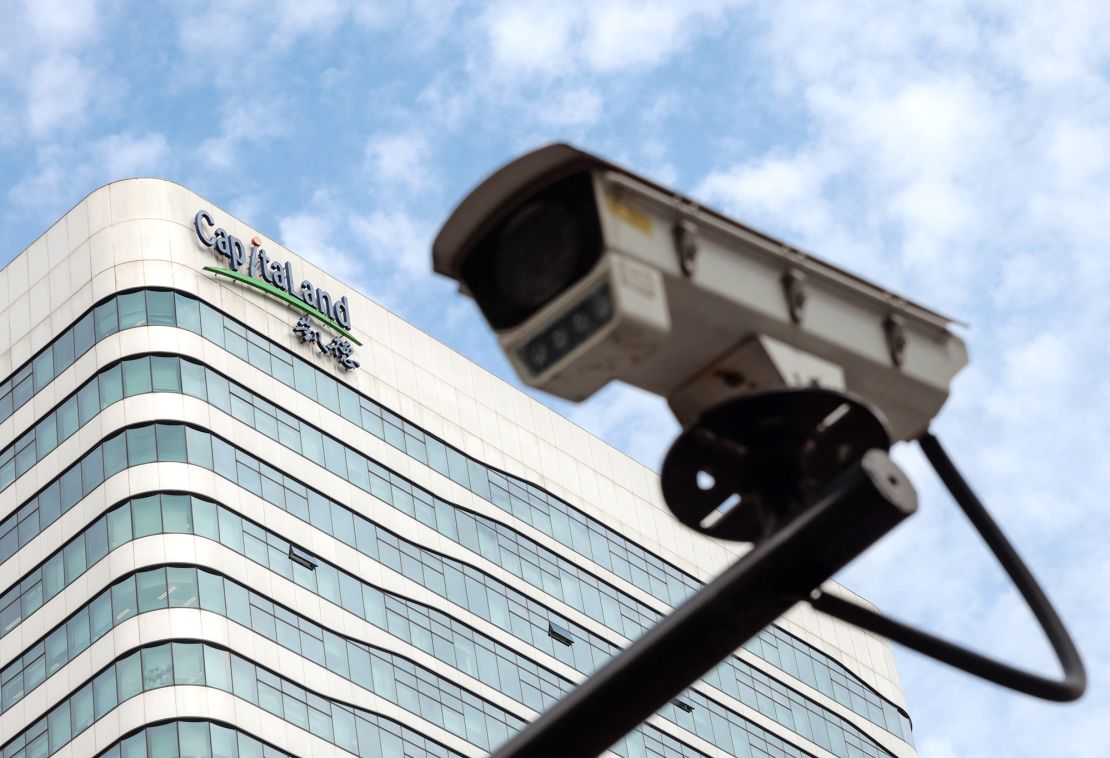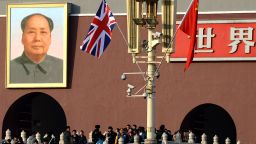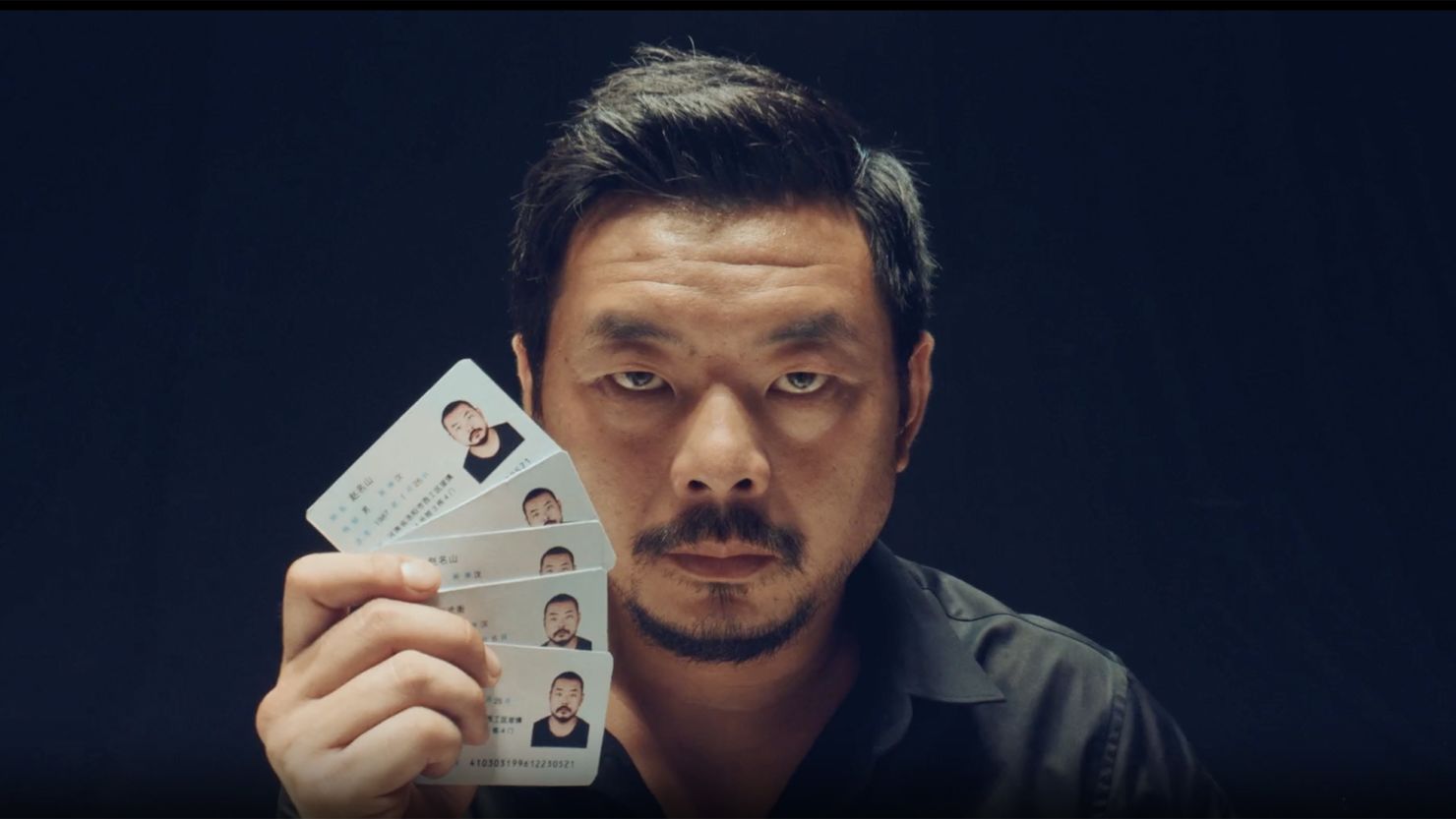
An actor playing a spy shows off his multiple identity cards in a propaganda video released by China's Ministry of State Security to warn the public about foreign spies.
Ministry of State Security
China sees foreign threats ‘everywhere’ as powerful spy agency takes center stage
By Nectar Gan, CNN
10 minute read
Published 8:38 PM EDT, Sun April 21, 2024
Editor’s Note: Sign up for CNN’s Meanwhile in China newsletter which explores what you need to know about the country’s rise and how it impacts the world.
Hong KongCNN —
In a slick video marking the National Security Education Day, China’s top spy agency has a stern message for Chinese people: foreign spies are everywhere.
As ominous music plays, a broad-faced, beady-eyed man disguises himself as a street fashion photographer, a lab technician, a businessman and a food delivery driver – he even sets up an online honey trap – to glean sensitive state secrets in various places and industries.
“In the sea of people, you may have never noticed him. His identity is changeable and his whereabouts are hard to find,” a narrator says. “They are everywhere, cunning… and sneaky, and they may be right here in our lives.”
Eventually, Chinese police catch the spy in a dramatic ambush after state security authorities receive multiple tip-offs from the public.
“They can disguise as anyone. But among the crowds you and I together are protecting national security,” the narrator concludes. “We 1.4 billion people are 1.4 billion lines of defense.”
The three-minute video is the latest propaganda push by China’s powerful civilian spy agency, the Ministry of State Security (MSS), to mentally arm the Chinese public against what it sees as the growing threat of foreign espionage.
Under Xi Jinping, China’s most authoritarian leader in decades, the country’s notoriously secretive spy agency has drastically raised its public profile and broadened its remit.
From a shadowy organization without any discernable public face, the MSS has been transformed into a highly visible presence in public life.
In Chinese cities, posters and slogans promoting national security are now a common sight on sidewalks, subway trains, campuses and billboards. On social media, the ministry commands a massive following with near-daily commentaries, short videos or even comic strips sounding the alarm about supposedly ubiquitous threats to the country.
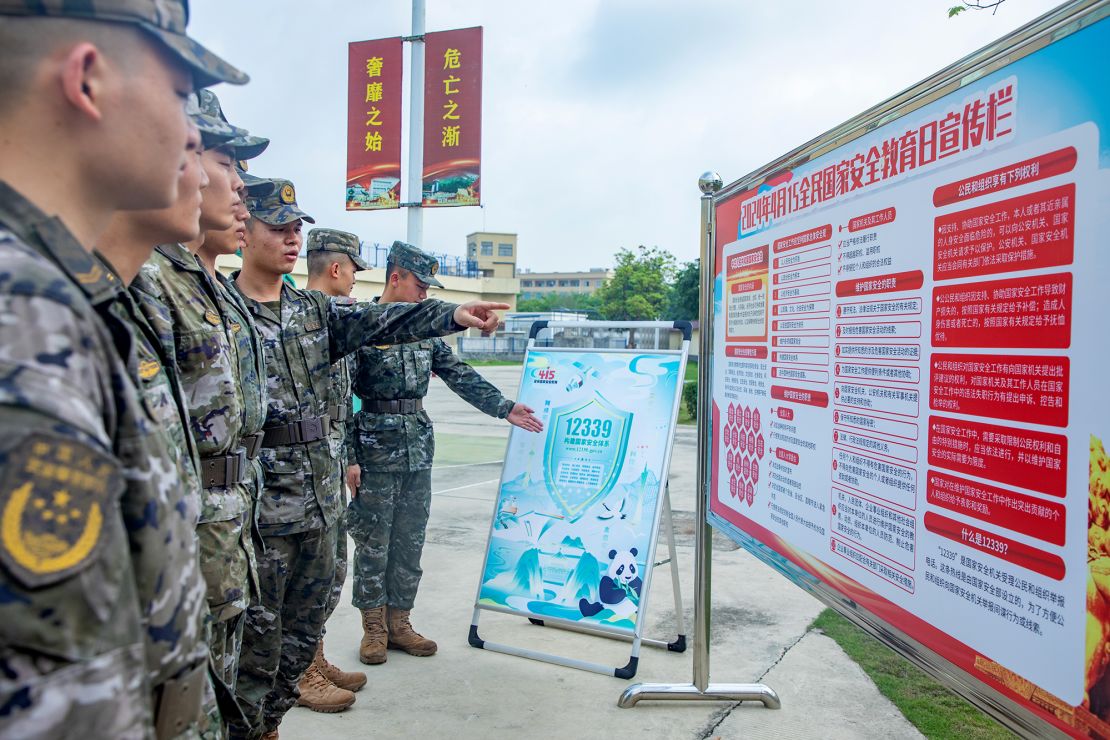
Chinese soldiers look at a poster promoting national security in the southwestern city of Beihai on National Security Education Day on April 15, 2024.
CFOTO/Future Publishing/Getty Images
According to the MSS, foreign spies are omnipresent and infiltrating everything – from mapping apps to weather stations. The ministry has also posted details of what it claims are espionage activities carried out by American and British spy agencies, and detailed how Chinese nationals studying or working abroad have allegedly been recruited by the CIA.
Last week, as part of a documentary to mark National Security Education Day, the MSS revealed that a Chinese scientist convicted of selling state secrets to a foreign intelligence agency was executed in 2016. The documentary did not explicitly mention which country, but its images show an American flag and the US Capitol building.
The MSS’ transformation is part of Xi’s sweeping pivot to ramp up national security in the face of heightened geopolitical tensions and mounting domestic challenges.

RELATED ARTICLEBeijing claims US citizen jailed for life in China was decorated spy who worked undetected for decades
As US-China relations fray, the MSS has undertaken significant efforts to provide guidance to other government agencies and broader society, said Xuezhi Guo, a professor of political science at Guilford College in the US.
“These endeavors aim to foster anti-espionage awareness and enhance security measures in light of the evolving landscape of espionage threats,” he said. “The goal is to empower Chinese citizens and entities with the knowledge and skills required to bolster their vigilance and preempt espionage activities effectively.”
The emphasis on external threats also helps Beijing deflect criticism at home over its own policies by shifting blame onto “foreign forces” – a playbook the Chinese government has repeatedly applied during periods of public discontent, most recently over protests in late 2022 against Xi’s hardline measures to prevent Covid.
And the spy agency’s extending reach is a sign of the increasing securitization of Chinese life and society under Xi, where “an incredibly wide array of issues can be viewed as threats to national security,” said Sheena Chestnut Greitens, director of the Asia Policy Program at the University of Texas at Austin.
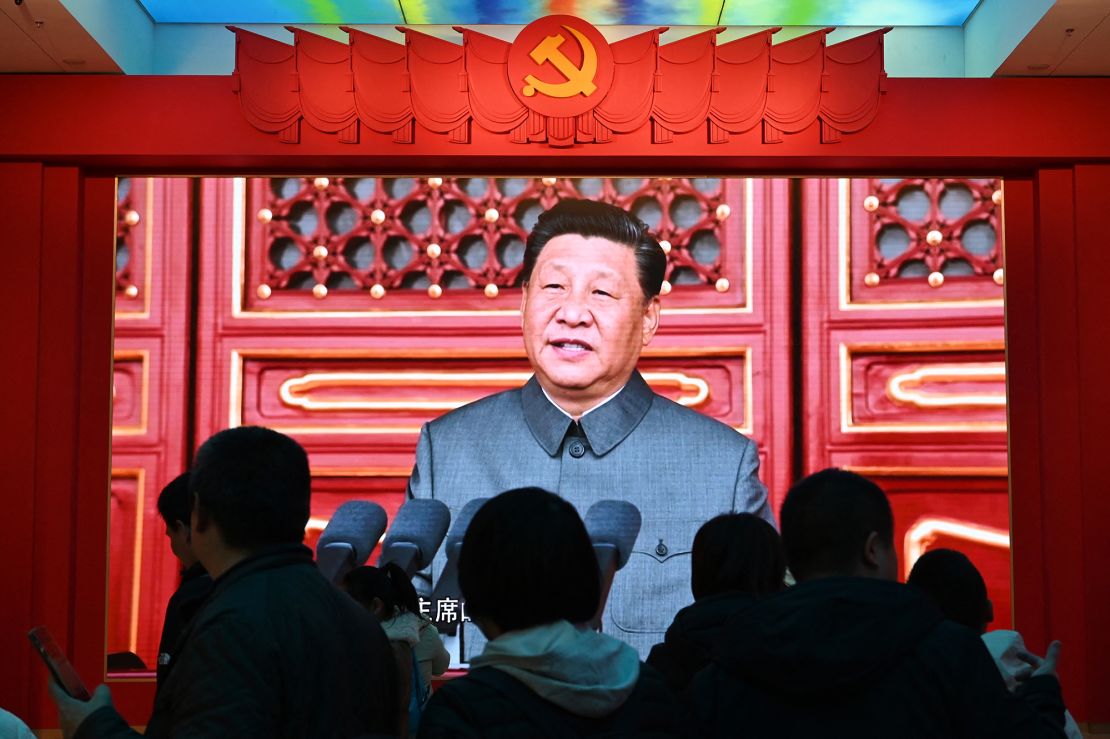
Chinese leader Xi Jinping has transformed the country's shadowy spy agency into a highly visible presence in public life.
Greg Baker/AFP/Getty Images
High profile
The MSS was born out of a reassessment of China’s national security needs in the early 1980s, as the country emerged from decades of political upheaval and self-imposed isolation under Chairman Mao Zedong to embrace market reforms and open up to the world.It was founded in 1983 by merging an intelligence department of the ruling Chinese Communist Party and a counterespionage unit in the police force. It oversees intelligence and counterintelligence both within China and overseas, with provincial and municipal branches extending throughout the country.
It is often likened to a combined CIA and FBI, though the MSS long operated under a heavier veil of secrecy, without an official website or any publicly listed contacts or spokesperson.
But China’s spy agency has gradually stepped out of the shadows as Xi makes national security a key priority.
In 2015, the MSS established its first public point of contact by setting up a hotline and a website to encourage people to report any suspected threats to state security. In the same year, China designated April 15 as National Security Education Day.
And in 2020, the ministry started to churn out promotional materials – from posters to animations – under a dedicated office named the National Security Propaganda Studio.
The following year, the MSS gave an unprecedented written Q&A to state media, introducing its role and recruitment channels to the public for the first time. Later in the year, an official in charge of the spy agency’s educational and propaganda work showed up on the prime-time news program of state broadcaster CCTV – a rare appearance that was noted by state media.

“Shenyin Special Investigation Squad” is a comic series based on real-life counterespionage operations, according to China's spy agency.
Ministry of State Security
The most drastic move came last August when the agency made its social media debut: it launched an official account on WeChat, China’s most popular social app, with a rallying call for “all members of society” to join its fight against foreign infiltration. Its posts regularly rack up hundreds of thousands of views and are widely shared by state media outlets.
And this year, the ministry dialed up its multimedia activity. In January, it launched a comic strip series called “Shenyin Special Investigation Squad,” featuring a team of five secret police officers hunting down foreign spies – plots it said were inspired by real-life counterespionage operations.
In one installment, a group of foreign-looking characters are tracked by the secret police as they try to extract strategic rare earth metals under the guise of survey work for real estate development; in another, an undercover MSS agent gets a job at a consulting firm to investigate its suspicious deeds, including its connections with experts in key sensitive fields.
“MSS’ decision to establish a social media presence is an anomaly given its traditionally low profile,” said Greitens at the University of Texas, who has studied China’s security apparatus.
One reason for the change may be the minister of state security, Chen Yixin, who was appointed in late 2022, according to Greitens.
Chen is widely seen as a trusted aide of Xi, having served under him for years when Xi was a provincial official in Zhejiang province. And he has a track record of using social media to drive home the official message.
“Chen has been saying for years that new media are important to guide public opinion on the party’s political-legal and national security work. So, part of this appears to be him putting his personal stamp on the Ministry’s work,” Greitens said.
In addition, China’s National Security Commission – a powerful body headed by Xi – approved a document on enhancing public education around national security work last May, which “seems to provide high-level cover for MSS’ course of action here,” she added.
